Too Brainy
There’s a reason Jay Chanderasekhar’s Super Troopers (2001) caught on — the absolute go-for-broke, beyond-hope stupidity of the characters. A similar thing worked for the Farrelly’s Dumb and Dumber and, going way back, Bill Pullman’s “Earl Mott” character in Ruthless People
If you really get it, deep-down genetic stupidity can be hilarious. And I don’t mean stupid-but-cool and not cleverly stupid and not uneducated but street smart…I mean, forget-about-it brontosaurus dumb. But you have to go all the way, and that’s what Chanderasekhar didn’t do when he shot The Dukes of Hazzard.
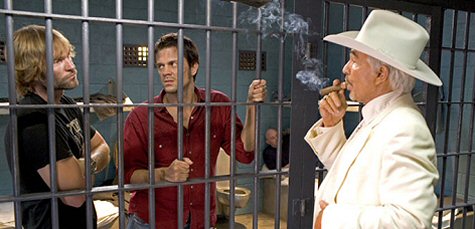
The Dukes of Hazzard costars (l. to r.) Seann William Scott, Johnny Knoxville, Burt Reynolds.
The characters of Bo Duke (Seann William Scott) and his brother Luke (Johnny Knoxville) are garden-variety yeehaws. But they’ve also been given a certain country dignity, and that’s what’s unfunny about this deeply painful film — the effort to try and put these guys over as likable rascals.
They need to be dribbling-saliva stupid but of course, that would be insulting to rural Southern audiences and the fans of the TV series, etc.
I’ll bet anyone a dozen corndogs that the producers (Bruce Berman, Bill Gerber, et. al.) said to Chanderasekhar, “We loved Super Troopers, but a lot of people love the TV series, so don’t make these boys too retarded….right? They’re ballsy guys…not too smart but cool and brash and all that. You know…round `em out a bit.”
< ?php include ('/home/hollyw9/public_html/wired'); ?>
So they made a shit movie that got a 25% positive rating on Rotten Tomatoes. And lots of people are going to shell out to see it this weekend. Hooray for Gerber and Chanderasekhar and the rest of the crew.
But Seann William Scott has pushed things right to the limit. He’s played the same spirited moron in 10 or 11 films over the last six years or so, and sooner or later audiences get sick of it and when they finally do you’re over. Scott is lucky…make that very lucky…that Richard Kelly has cast him in a mostly sober part in the currently shooting Southland Tales.
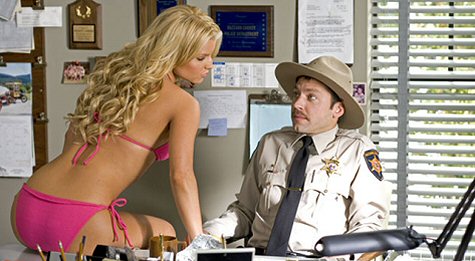
The thing that Jessica Simpson had (describe it any way you like) is now, with the debut of The Dukes of Hazzard, worth a good deal less.
Every critic in the country has gone to town with this thing, but two guys from Arizona — Phil Villarreal of the Arizona Daily Star and Bill Muller of the Arizona Daily Republic — are my favorites.
I especially like Villarreal’s comment, to wit: “Hell, suck the exhaust fumes from a 1969 orange Dodge Charger. But whatever you do, no matter how big a fan you were of the show, do yourself a favor by skipping this movie.”
In The Pudding
Seeing the smartly engaging Proof (Miramax, 9.16) right after The Dukes of Hazzard felt like a spring rainfall washing away toxic chemicals.
Directed by John Madden (Shakespeare in Love), Proof is an earnestly delivered, well-written intellectual drama — you can feel the structural discipline of David Auburn’s play all through it — with a title and theme that doesn’t just apply to mathematics.
I never saw Proof on Broadway but I know of its reputation, and I can understand where all the praise came from.
The film has some weak aspects, okay, but it’s certainly not flawed enough to have justified Miramax’s decision to shelve it last fall, or roughly eight or nine months ago. The research scores weren’t spectacular, I’m told, due to Gwynneth Paltrow’s remote and chilly performance, but it’s obviously an impassioned quality-level thing that will send no one out into the street feeling burned.
Why didn’t Harvey just release it and give it a shot? It’s far from an embarrassment. Smart, well crafted, food for thought. Why taint it by shelving it?
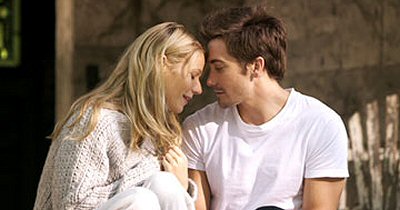
Gwynneth Paltrow, Jake Gyllenhaal in second-act scene from John Madden’s Proof
Madden called this morning and says Proof was pushed aside last year so Miramax could devote more time to pushing Miramax’s two big Oscar contenders, The Aviator and Finding Neverland, and that once the end-of-the-year slot was gone he insisted on a fall ’05 debut rather than a winter or spring opening.
Proof is about the cloistered world of mathematics scholars and a recently passed-away professor named Robert (Anthony Hopkins), once a genius-level pathfinder who lost his grip on sanity when he entered middle age.
The story is about his daughter Catherine (Paltrow) coping with the possibility that she may inherit his insanity, and particularly how to deal with a discovery in a notebook that Robert may have had a late-inning surge of brilliance and come up with a mathematical proof that will re-order everything. Simultaneously urging her forward and pitching woo is a young math student named Hal (Jake Gyllenhaal).
How do you prove love to someone you say you love? By trusting them absolutely, Auburn says. To question them, to ask for rationality or practicality is not love…it’s the lack of faith that ruins a love affair. This may well be true, but there’s a scene between Paltrow and Gyllenhaal in which this view is, I feel, insufficiently felt and invested in.
Paltrow’s Catherine is such a sourpuss, such a “no” person, such a killjoy that you almost want to ally yourself with her tedious sister Claire (Hope Davis), but she’s such a mediocre and unimaginative prig that you can’t help but recoil.
The one you support and identify with the most, of course, is Hal, a hopeful, positive, fully-engaged fellow. This is Gyllenhaal’s most winning character ever. For once — finally! — he’s not playing a withdrawn neurotic wearing a pained, woe-is-me expression.

But we should identify with and want to support Paltrow more — she’s carrying this thing on her back, bearing the burden — and while I found her performance believably lived in and particular and behaviorally convincing for the most part (Paltrow played the role in a play performed in London), I found it hard to really get behind her character. She’s so caught up in her private space, so unwilling to divulge or open up.
Catherine is a bit puzzling. She’s been touched by genius herself, and yet she’s so enmeshed in her neg-head attitude that she can’t summon the pride and force of spirit to at least claim recognition for that which is hers. She decides in act three to withdraw and submit to lethargy and depression rather than stand up for herself because if she accepts her genius, she also accepts the inevitable mental instability that will come later in life.
That’s a tough situation. I suppose I can relate to a woman who might feel reluctant to claim her rightful glory and her place in history out of fear of the burdens of being a genius…but for God’s sake, life is very hard…you might as well accept the glories and take your bows for what you’re good at because you’re certainly not going to escape the difficult stuff.
And yet Catherine is unlike any female character I’ve seen recently in a film. I enjoyed being in her company despite her constant gloomheadedness and general downer shit. (She would get along perfectly with Paul Giamatti’s “Miles” from Sideways.)
Hopkins seems to be phoning in his part of the once-brilliant father. He’s played these complicated living-in-their-head guys so often that it feels like an exercise.
One question that has to be asked is what exactly does coming up with a radical new proof in the realm of mathematics actually mean for the world? What does it have to do with the price of rice? What are the possible practical (or impractical) applications down the road? I realize it’s vital for mathematicians to be probing the bounds of the quantifiable universe, but we all know what the fast-food crowd will be saying.
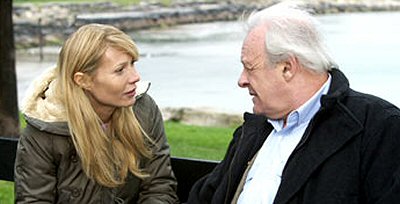
Paltrow, Anthony Hopkins in Proof
I started thinking about Albert Einstein after seeing Proof, and asking myself how exactly did Einstein’s theory of relativity affect the state of things? He expanded our knowledge of the exact properties of time and light and the ramifications of space travel, and he alerted FDR to the work being done by the Germans on building a nuclear bomb…but what does all this fascinating mumbo jumbo in Proof about breaking ground and pushing the mathematical envelope and re-configuring high-level math concepts really have to do with…well, anything?
In dramatic terms it isn’t all that relatable. People always admire pioneers and anyone exploring new turf, but what Hopkins and Paltrow and Gyllenhaal and their friends are all hopped about feels a little bit mysterious and maybe even a little so-whatty.
I’m not for a moment dismissing higher mathematics, but anyone who sees this film will be hard-pressed to come to a conclusion about what it all boils down to from even a semi-grounded perspective.
Of course, all this stuff I’ve been discussing was probably in the play. So why did Harvey even make this thing if he wanted to reach the people who eat dinner at McDonalds?
Re-Selling Cavett
For me and anyone else who loved watching “The Dick Cavett Show” on ABC from ’69 to ’74, the pleasures of the show were primarily about inquisitiveness, urbanity and cultivation. The idea was to entertain and get ratings, etc., but always with an aura of class.
You could always count on Cavett’s witty humor and his having these intoxicating, extra-brainy conversations with his fascinating guests, who tended to reside above the level of Don Rickles. And then there were the wild incidents (like Lester Maddox walking off the show when Cavett refused to apologize over some blithe remark) that would happen from time to time.
But these aspects of the show are perhaps a bit too challenging for today’s audiences. This, at least, is the decision of a distributor called Shout! Factory, which will be issuing a series of Cavett DVDs over the next five years.
I got wind of this after running into Cavett on Lexington Ave. last Wednesday and we got to talking about Shout’s first DVD package coming out later this month called The Dick Cavett Show: Rock Icons.
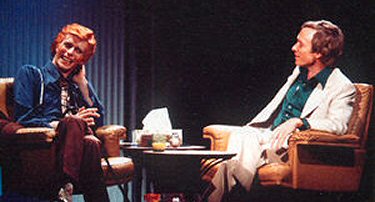
David Bowie speaking to Dick Cavett sometime during the his Ziggy Stardust phase, probably in ’73 or thereabouts.
It’s basically footage of ’70s rockers like Janis Joplin, David Bowie, George Harrison, Sly And The Family Stone, Stevie Wonder and others performing on his show, plus some conversation.
The following day (i.e., yesterday) I spoke to Robert Bader of the L.A.-based Shout! Factory. Bader said he’s been watching tapes of the Cavett show for the last 18 months and that he’s looking very much forward to turning on new generations of fans to Cavett’s sublime talent as a celebrity interviewer and late-night wit.
But he said something disturbing as well, which is that after looking at the tapes his conclusion is that Cavett’s literary-cultural shows don’t entertain as well as the others.
On top of which he has to “sell” these shows to the Shout! marketers, so basically they’re putting together packages that are more broadly marketable. Packages, in other words, that will attract people who shop at Target.
The “Rock Icons” collection comes out on August 16th, followed by a collection of Ray Charles shows (three shows, 14 performances of songs) on 9.13, a DVD devoted to guest appearances by John Lennon and Yoko Ono (due in November), and then a “Comedy Icons” package that’ll be out sometime in the first quarter of ’06.
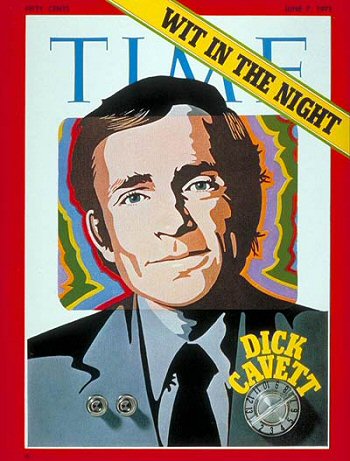
Dick Cavett as he appeared on cover of Time‘s 6.5.72 cover story, published at the apex of his popularity and influence.
Then, if Bader pitches them well and other packages sell decently, we’ll see “Hollywood Legends” (Marlon Brando, et. al.) and “Great Filmmakers” disc sets. Neither of these has been confirmed with the marketing people but Bader is going to push for them.
Which is all well and good, but if you ask any fan about the “Dick Cavett Show,” they’ll all say it was the show’s intellectual and cultural and sometimes political discussions that were the prime signature.
It’s what separated Cavett from Johnny Carson, who, sharp and funny as he was, was always a man of conservative Nebraskan sensibilities and mainstream showbiz tastes. In today’s terms, Carson had the reds and Cavett had the blues. Cavett’s show was a slightly more uptown Charlie Rose with laughs and an audience…a slightly less downscale David Letterman.
Bader says some of the writers and cultural types I’m interested in will be woven into tapes featuring rock stars and guests like Mickey Mantle and John Wayne so all is not lost, but obviously the chances of seeing Cavett DVDs of those famous shows with Gore Vidal, Norman Mailer, Truman Capote and other literary types are not high right now.
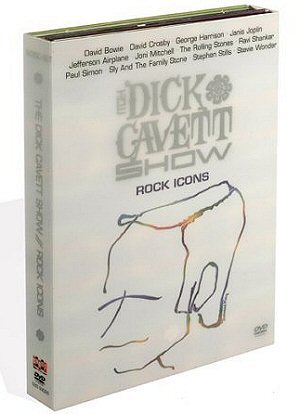
The Dick Cavett Show “Rock Icons” DVD set, being issued by Shout! on 8.16.
Bader is a smart guy and knows what he’s talking about. He’s also a realist in terms of the marketplace and what he can get the company to release.
“The reality of the present marketplace is not to be dismissed lightly in matters like releasing ‘The Dick Cavett Show’ on DVD,” he says. “We feel that we have an extremely valuable commodity and are carefully working out our releases in order to put out as many sets as possible. I think it would be safe to say that we don’t want to put out a set that sells 5,000 copies right now. We would not get too far into our planned series of releases if that were to happen.”
Bottom line: a beloved late-night showcase of comic wit, urbanity and sophistication in the early ’70s, a show that reflected to some extent the turbulence and cultural upheavals of that era, is being repackaged to modern DVD viewers as…I’m tempted to say as an upscale “Ed Sullivan Show.”
No would argue that mainstream America is a much more conservative and reactionary culture today than it was in the ’70s, and all of that lefty-intellectual New York conversational stuff from the ’70s probably won’t play that well in 2005 Peoria…if in fact it ever did.
We all know that a DVD needs to sell to “red” America if it wants to end up in the black, and the cultural dissolution that has occurred in this country over the last 30 years is not a myth. It may be a clich√É∆í√Ǭ© to say that we were a brighter, more inquisitive, more intellectually alert nation back then…but we were.
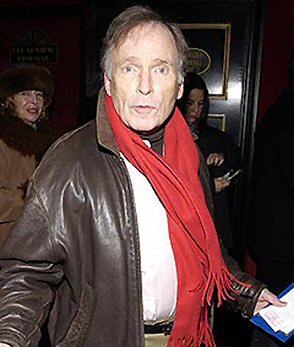
I’m glad these DVDs are coming out, but I have to say I’m more than a tiny bit disappointed.
The film industry has produced two Truman Capote movies over the last year or so. The first, Bennett Miller’s Capote (Sony Pictures Classics), will debut at the Toronto Film Festival and hit theatres in late September. Then comes Douglas McGrath’s Have You Heard? (Warner Independent), but not until the fall of ’06.
Obviously there are producers and distributors who are convinced that there’s some kind of decent-sized audience out there that knows and cares about Capote and who he once was.
It therefore seems odd that a celebrated TV talk show that was (a) known for its intellectual edge, (b) had Capote on a few times and (c) is issuing commemorative DVDs of its glory days isn’t, right now, thinking about including the appearances of Capote and other literary types who were grandly associated with this show in its heyday.
In fact, the more I think about it, the more depressing it seems.
“If I put out ten shows with authors as the main guests at the start of our release cycle, I can assure you we’d be in deep trouble,” Bader admits. “You and I might be dying to see Tennessee Williams chat it up with Dick but by and large the public that purchases these things finds Dick’s incoherent chat with Sly Stone infinitely more entertaining.”
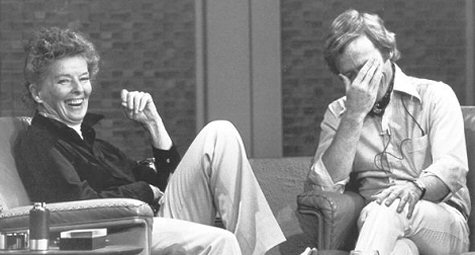
Katherine Hepburn during show that Cavett devoted entirely to interviewing her and her alone.
Rainfall
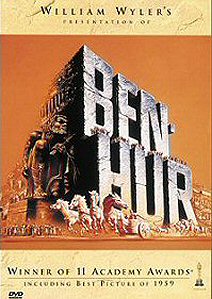

Jacket art for DVD of William Wyler’s Ben-Hur six or seven years ago (l.) and jacket art for upcoming four-disc version (r.). The obvious difference is that arid ancient Judea, where most of the film takes place, has become a much greener place.
Wilson-Flynn
“While I agree that Owen’s a little — make that very — thin-skinned for telling his lawyers to suppress the Butterscotch Stallion T-shirt, I’m not so sure about your question regarding Errol Flynn. He hated not only the phrase ‘in like Flynn’ but every joke that mentioned him. In fact, he hated comedians in general (other than Jimmy Durante, who didn’t do Flynn jokes). I learned all this from his posthumous autobiography, which the publisher entitled…’In Like Flynn.’ Hey, he was dead.” — Kevin Kusinitz, New York, NY.
Wells to Kusinitz: Nope…incorrect. Flynn’s autobiography was called “My Wicked Wicked Ways.” And none of the Flynn biographies I’ve discovered online were called that.
John Lennon vs. Italians
“You wrote in your WIRED item about Don Scardino’s Lennon Broadway show that’s opening on 8.14 that ‘anyone whose name ends with a vowel would probably get John Lennon wrong anyway.’
“Dude, what the fuck is that all about? You’ve been administering a pretty fair amount of vitriol to one contingency or another for quite some time, but really, what are you actually trying to say with that? I’m sure there is some sort of half-cocked generalization to be made about folks whose last name is some sort of pointless pluralization as well, but why make the effort? Focus, dude.” — Brian McIntire.
Wells to Mcintire: I was basically saying that the odds are against a New York-area Italian-American like Don Scardino really and truly understanding who and what John Lennon — a working-class Brit from Liverpool — was deep down. It takes blood to know blood.
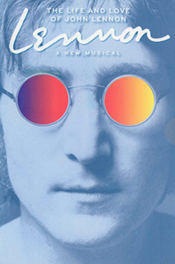
Spike Lee made the same point about ten years ago when he argued that Norman Jewison was the wrong guy to direct a biopic about Malcolm X…that a black director like himself felt and understood things about Malcolm X’s life that were beyond Jewison’s ability to see or properly dramatize.
I don’t think Scardino can get Lennon any more than Lennon, when he was alive, could have been expected to write an authentic song about the Italian doo-wop music culture that arose from New York City area in the 1950s.
And by the way, here’s a portion of a news story about the delay of the Lennon show: “When asked about speculation that David Leveaux (Fiddler on the Roof, Nine) was brought in to replace director Don Scardino, a production spokesperson said that Leveaux ‘is a friend of the production and has offered support to Don Scardino and the creative team.'”
The word is that the show is dreadful and will probably close before too long.
Grabs
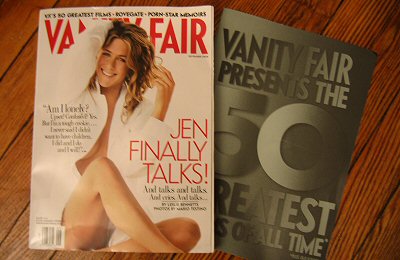
The new Vanity Fair “50 Greatest Films of All Time” supplement in the Jennifer Aniston issue is rather whore-ish. It’s like an advertising supplement for Turner Classic Movies, which has bought all the advertising. The great film choices are fine (I’ll go with Old School as one of the 50…as some kind of perverse joke) but the writing is totally rote, like something pulled out of a Golden Retriever video catalogue.

I figure it’s okay to say I had lunch at Cafe Boulud on East 76th Street on Wednesday with screenwriter and industry spitballer William Goldman (All The President’s Men, Misery, Marathon Man). We just talked about stuff…nothing for attribution. Nobody…knows…anything.

The formidable Trevor Jett Wells, deep in thought and trying to bang out an assignment for a journalism pre-college course at NYU — Sunday, 7.31, 7:55 pm.

Very cool bar on First Avenue near 3rd or 4th Street.

Lobby of the Carlyle Hotel — Wednesday, 8.3, 2:45 pm.
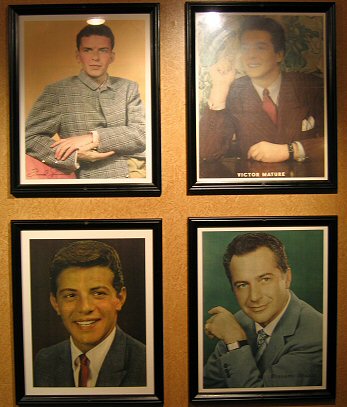
If you dont know these faces….
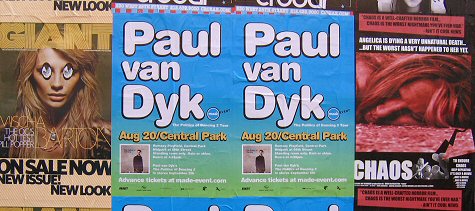
Wildposts on 15th Street near 8th Avenue — Tuesday, 8.2, 5:50 pm.

Old snaggle-tooth…fearsome but kinda cute in a brute-beast sort of way.
